-
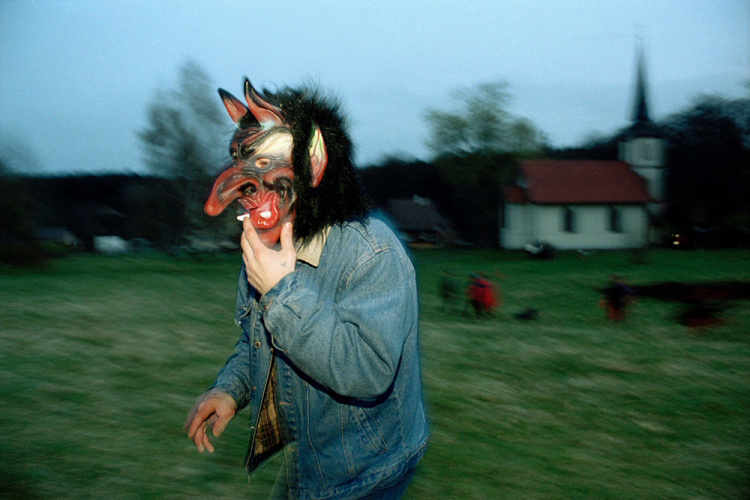 According to ancient German folk beliefs, Walpurgis Night is always a night full of magic.
According to ancient German folk beliefs, Walpurgis Night is always a night full of magic. -
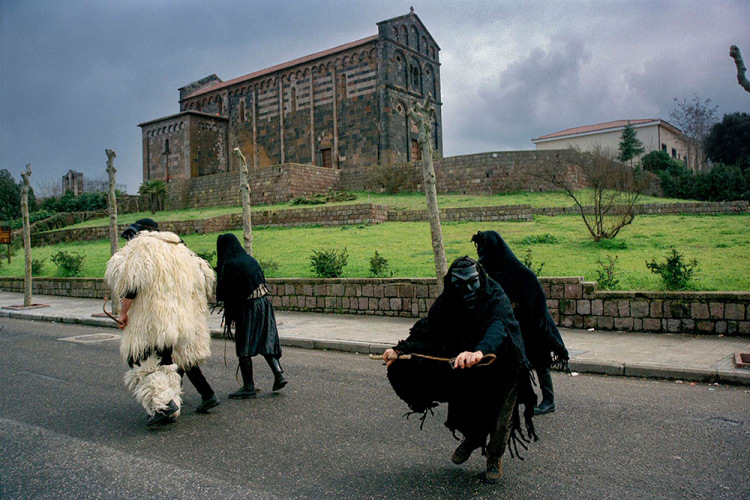 The Feste Pagane of Sardinia symbolize the struggle between the shepherds and the evil spirits that freeze the land in the winter. Anyone who comes too close to the Merdules gets vicious lashes, and the photographer is no exception.
The Feste Pagane of Sardinia symbolize the struggle between the shepherds and the evil spirits that freeze the land in the winter. Anyone who comes too close to the Merdules gets vicious lashes, and the photographer is no exception. -
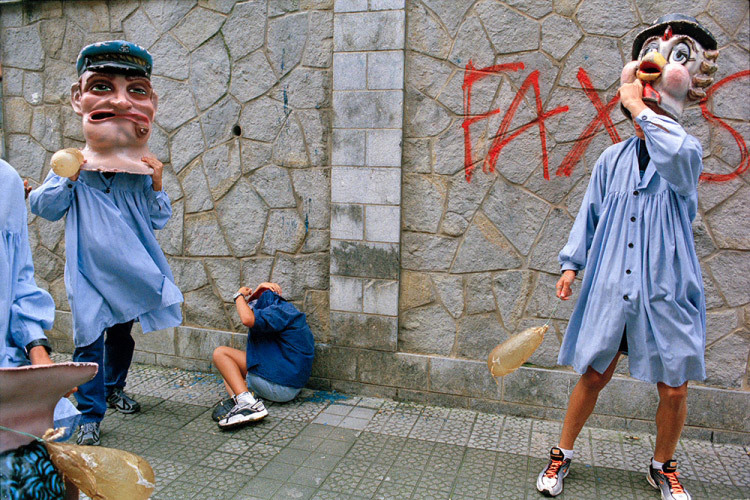 Aurresku and Calamuzo: these are the key ingredients of the Basque Jaiak, or village festival. In the meanwhile, the Gigantes and Cabezudos (Giants and Big-Heads) run through the streets to slap everyone they meet with pig bladders.
Aurresku and Calamuzo: these are the key ingredients of the Basque Jaiak, or village festival. In the meanwhile, the Gigantes and Cabezudos (Giants and Big-Heads) run through the streets to slap everyone they meet with pig bladders. -
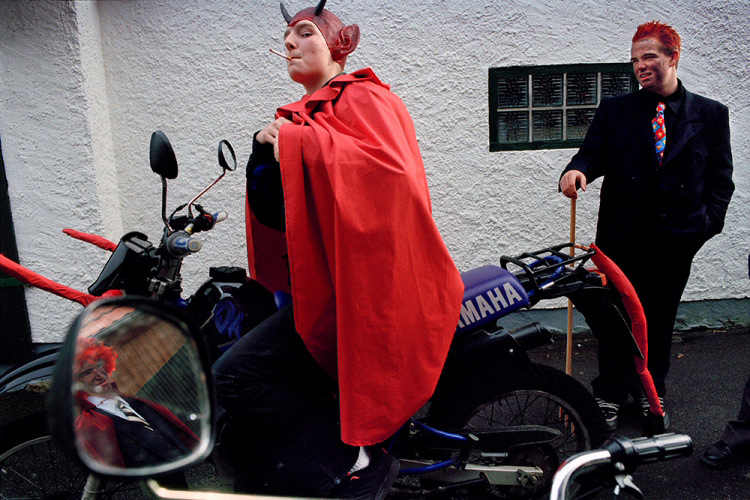 It was here in the village of Elend, in the German Harz Mountains, where Goethe wrote the Walpurgis Night chapter of Faust.
It was here in the village of Elend, in the German Harz Mountains, where Goethe wrote the Walpurgis Night chapter of Faust. -
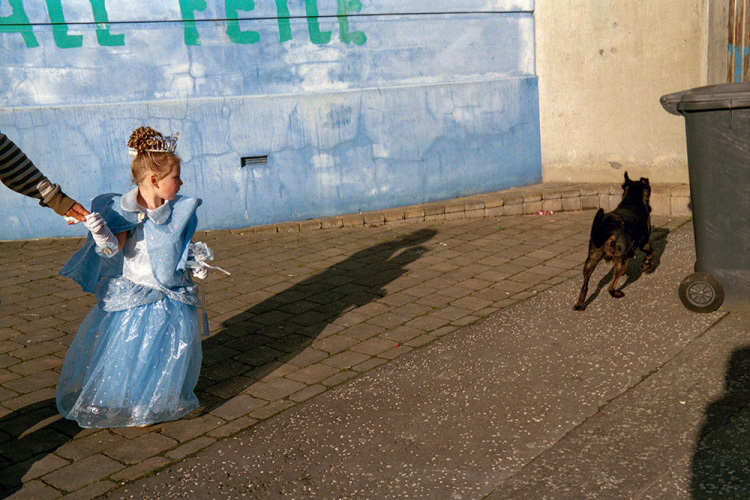 Ireland is the cradle of Halloween. Here in Derry, Northern Ireland, it is still an important festival. All Saints’ Eve, also known as All Hallows’ Eve or Hallow-e’en, is very special for the Celts: on Hallow-e’en, the gate to the ‘Other Side’ opens up.
Ireland is the cradle of Halloween. Here in Derry, Northern Ireland, it is still an important festival. All Saints’ Eve, also known as All Hallows’ Eve or Hallow-e’en, is very special for the Celts: on Hallow-e’en, the gate to the ‘Other Side’ opens up. -
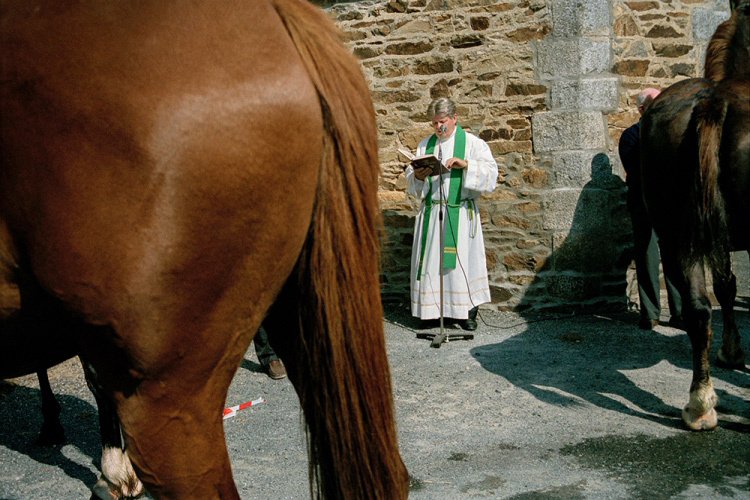 July 14th, Goudelin, Brittany. They celebrate this date in their own special way. Here all horses are named after Saint Eloy to herald the harvest season.
July 14th, Goudelin, Brittany. They celebrate this date in their own special way. Here all horses are named after Saint Eloy to herald the harvest season. -
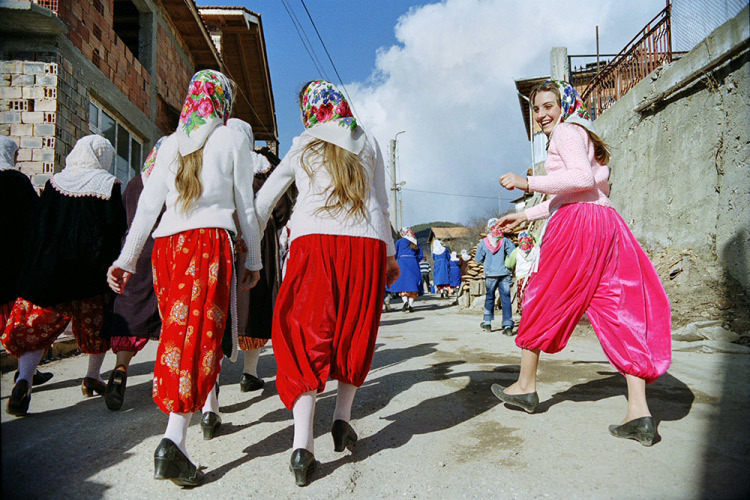 Fikre (21) and Dzhamal (20) are getting married in Ribnovo, Bulgaria. Their Pomak wedding ceremony lasts three days, and the whole village takes part in it.
Fikre (21) and Dzhamal (20) are getting married in Ribnovo, Bulgaria. Their Pomak wedding ceremony lasts three days, and the whole village takes part in it. -
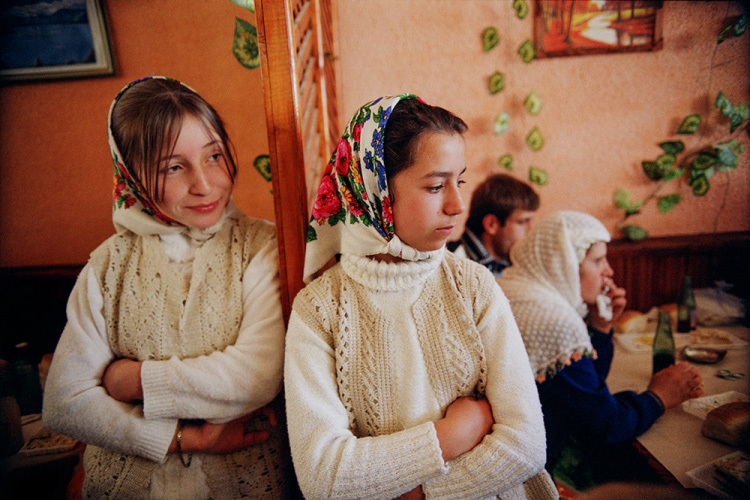 Pomak wedding ceremony in Ribnovo, Bulgaria. The Roma band is playing the zurna and the tupan continuously and exuberantly.
Pomak wedding ceremony in Ribnovo, Bulgaria. The Roma band is playing the zurna and the tupan continuously and exuberantly. -
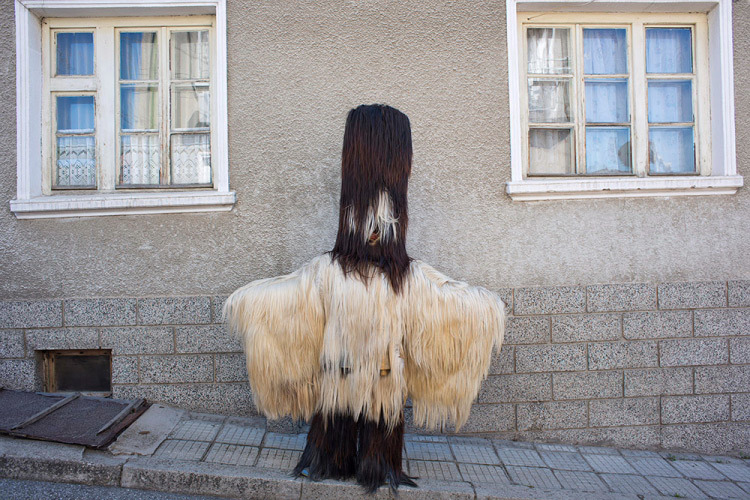 Every year, villagers who emigrated or moved away from Eleshnitsa village in Bulgaria, return for the parade of the Kukeri, although the number of young people who return for the festivities is decreasing. In the Communist period, Eleshnitsa was a thriving industrial city. It has since emptied out. Many of its villagers now work in England. ‘Ne Evropa: Orient! ‘ shouted a man in my ear when the Roma band started playing.
Every year, villagers who emigrated or moved away from Eleshnitsa village in Bulgaria, return for the parade of the Kukeri, although the number of young people who return for the festivities is decreasing. In the Communist period, Eleshnitsa was a thriving industrial city. It has since emptied out. Many of its villagers now work in England. ‘Ne Evropa: Orient! ‘ shouted a man in my ear when the Roma band started playing. -
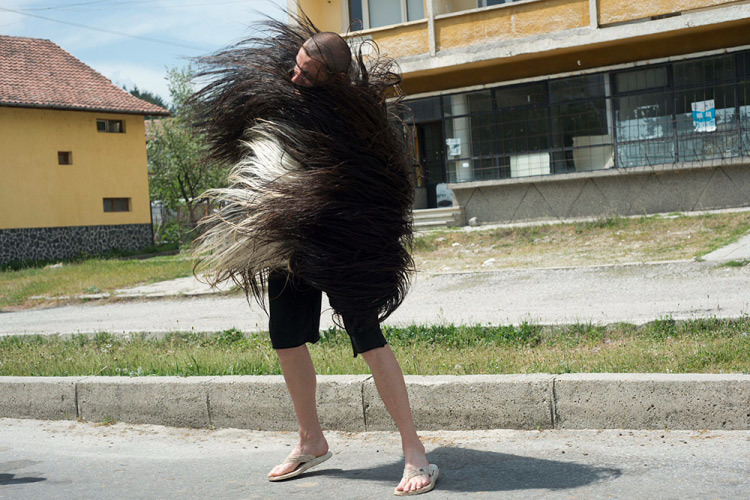 Nikolai shakes off the water after washing his costume in the river that runs through Eleshnitsa. He washes it every year the day before the festivities begin.
Nikolai shakes off the water after washing his costume in the river that runs through Eleshnitsa. He washes it every year the day before the festivities begin. -
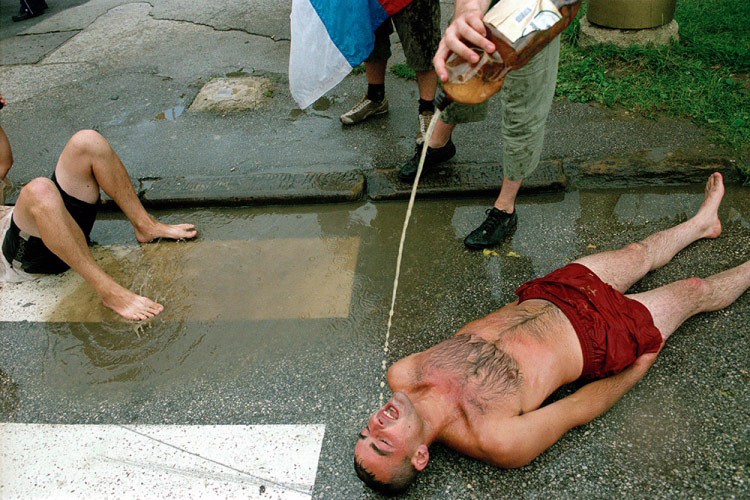 The Sabor Trubaca festival in Guca has begun. The party lasts all week long. Gypsy or Roma bands play on every street corner and in every pub or restaurant. Cocek music and dancing share many Turkish influences. The atmosphere in the village of Guca is friendly, yet at the same time very nationalistic.
The Sabor Trubaca festival in Guca has begun. The party lasts all week long. Gypsy or Roma bands play on every street corner and in every pub or restaurant. Cocek music and dancing share many Turkish influences. The atmosphere in the village of Guca is friendly, yet at the same time very nationalistic. -
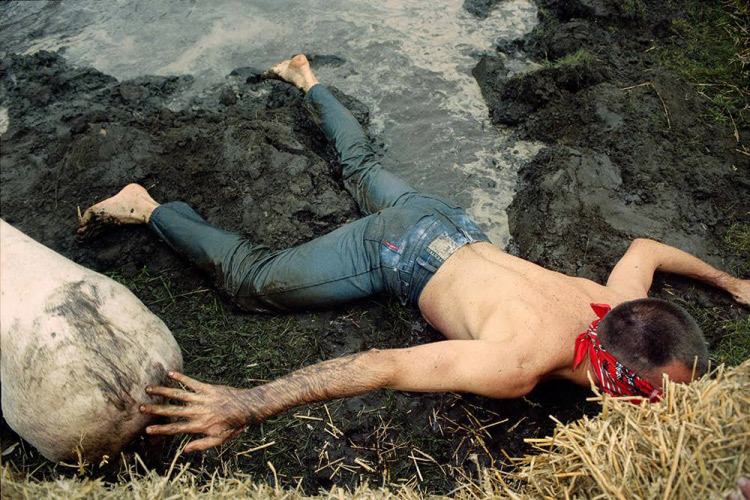 Zwientje tikken, or swine catching, is an old annual Dutch game. The origin of this game remains unknown.
Zwientje tikken, or swine catching, is an old annual Dutch game. The origin of this game remains unknown.
Devils & Angels, Ritual Feasts in Europe
For my photobook Devils & Angels, Ritual Feasts in Europe I scoured
the European continent in search of ritual feasts. In total, I ended up
spending more then ten years compiling these strange and varied rituals.
In the process, I visited gatherings in 15 different European
countries. But these photos are about more than the feasts themselves.
They are about a Europe that es deeper than the politics of Brussels,
of Strasbourg, of the struggling European Union. This project brings
together stories and beliefs that underscore the individual uniqueness
of the communities that make up Europe—as well as the surprising
similarities and parallels that can be found across the continent. The
focal point throughout is the immaterial cultural heritage of Europe, a
heritage in which the local tradition remain visible. A full selection
of my images have been put together in a beautifully-made book, designed
by the famed Teun van der Heijden.
My name is Friso Spoelstra
and I'm a documentary photographer from Amsterdam, born in 1968 . After
my graduation from Gerrit Rietveld Academy in Amsterdam I worked mainly
as freelance photographer for Dutch daily papers and magazines. But I
never thought of myself as a real news photographer so I changed my
focus to long term projects. Regularly I'm having exhibitions in The
Netherlands and abroad. My other photobook 'Boat People Of
Amsterdam'allows a to glimpse into their lives and tries to answer the
question what these people are looking for in this life on the water.My
work has been published, among others by: National Geographic,
GEO-Magazine and The Guardian.
